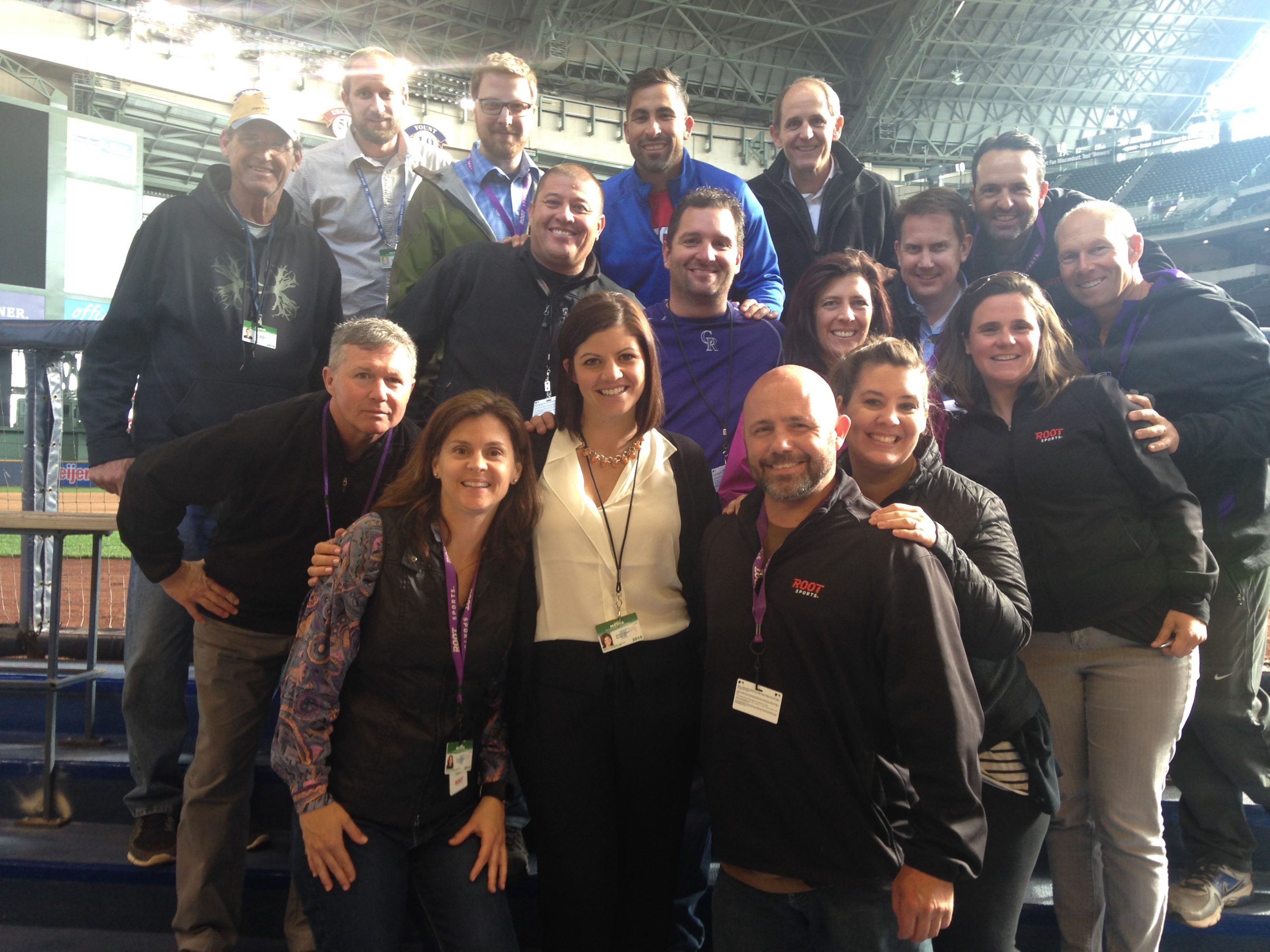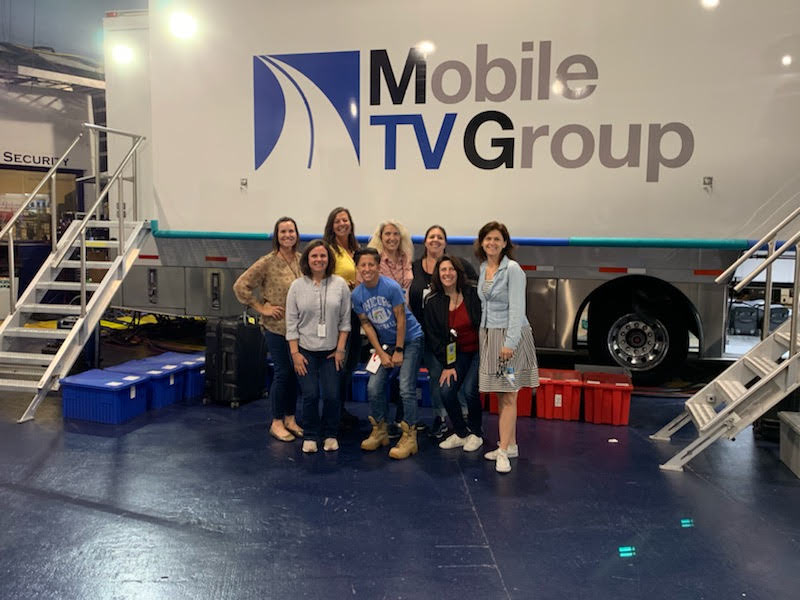AT&T SportsNet Rocky Mountain Blazes Trail for RSNs With Female Leadership — in the Truck and in the Booth
Director Erica Ferrero and producer Alison Vigil are at front bench, Jenny Cavnar does play-by-play for selected Colorado Rockies games
Story Highlights
This year in sports broadcasting has been notable for historic moments for women in the announce booth. During the baseball season, an Orioles-Rays game on YouTube in July featured the first all-female broadcast crew in MLB history, and, during ESPN’s coverage of Padres-Dodgers tomorrow night, Melanie Newman and Jessica Mendoza will make up the first all-female broadcast team to call a national MLB telecast.
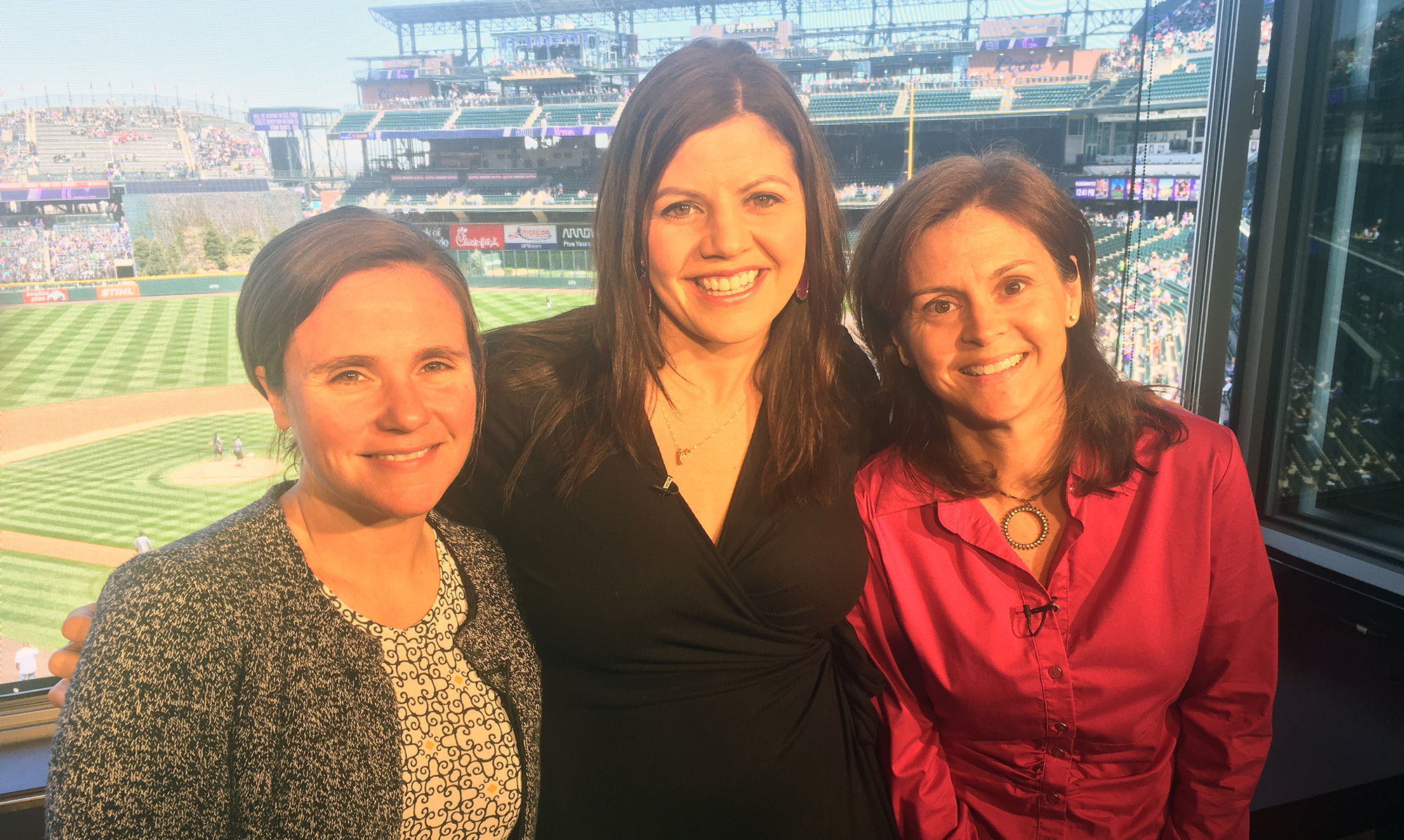
From left: AT&T SportsNet Rocky Mountain Producer Alison Vigil, announcer Jenny Cavnar, and Senior Director Erica Ferrero in the Rockies booth at Coors Field
Having more women calling games is a new and welcome development in the MLB, but it’s nothing new for AT&T SportsNet Rocky Mountain. Not only has Rockies pre/postgame studio host Jenny Cavnar served as play-by-play announcer for selected games on the Denver-based RSN since 2018, but its Rockies broadcasts are led by women at the front bench, with Senior Director Erica Ferrero handling 100+ games and producer Alison Vigil producing 80+ games per season.
SVG sat down with Cavnar, Ferrero, and Vigil to discuss how they got into the industry, how the pandemic has impacted their productions, their core production philosophies, advice they would give other women looking to break into the industry, and how they hope industry opportunities will improve in the future.
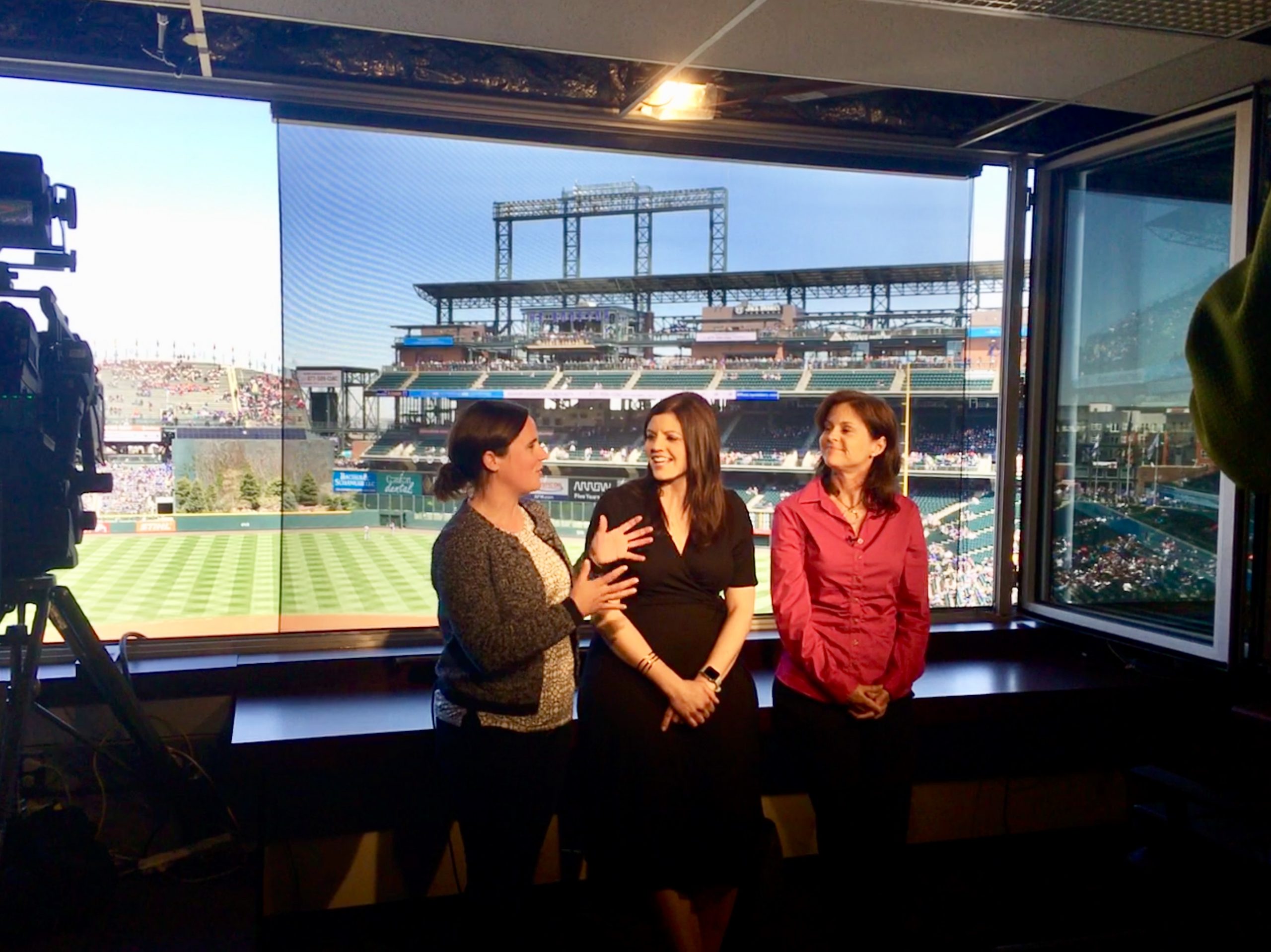
From left: AT&T SportsNet Rocky Mountain’s Alison Vigil, Jenny Cavnar, and Erica Ferrero are the first all-female team to call a Major League Baseball game.
How did you get started in the sports-broadcasting industry, and what has your career trajectory been?
Ferrero: I was a computer-science major at UC Santa Barbara, but the drama department was looking for volunteers to shoot their performances, so I [served as] a cameraperson. That was my first exposure. I really liked it, but I thought I’d rather be the person seeing all the cameras so I became interested in directing. I started in news [at KEYT-TV] in Santa Barbara and then in Denver [at KUSA-TV and KCNC-TV]. Then I began directing some sports and eventually ended up directing Rockies games at Fox SportsNet Rocky Mountain. I was lead EVS operator for the Nuggets for a couple of years and have now been back doing the Rockies for 11 years as well as Mountain West Conference football and basketball and some other sports.
Vigil: I went to college for broadcast journalism at Indiana University in Pennsylvania and definitely always wanted to be some sort of journalist. I ended up interning at the NBC [affiliate] in Philadelphia and didn’t love the news world, so I started exploring the sports side of things. I worked some preseason Eagles games, and it felt like a dream come true. I got lucky being in the right place at the right time and moved to Denver to work with FSN Rocky Mountain as they were starting their news broadcasts. I also have three kids so I took a bit of a hiatus, but I’ve now been with the Rockies for almost 15 years.
Cavnar: I was a business major at Colorado State University but grew up loving sports and always knew I wanted to be a sports reporter. I began working productions for the campus station and also the local radio station and then ended up doing sidelines [reports] for local Colorado State football and got hooked. I bounced around a little and coached lacrosse at UCLA for two seasons but eventually found my way back to TV. My first job was in Flint, MI, and eventually I ended up in San Diego [hosting the pre/postgame shows for] the Padres in 2007. I took the job in Colorado [as Rockies pre/postgame studio host] in 2012, so this is my 10th season covering the Rockies and 15th overall in Major League Baseball.
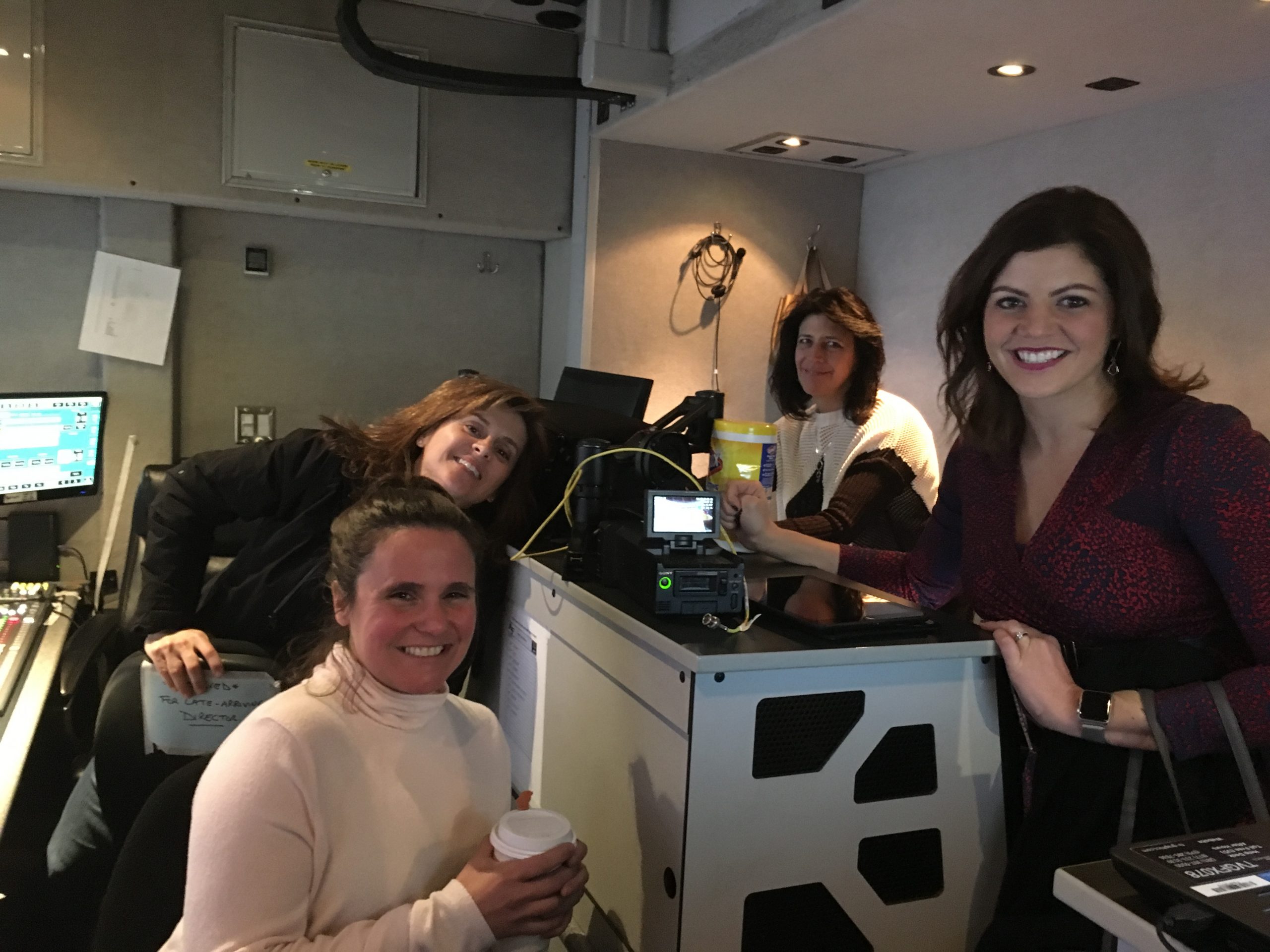
Jenny Cavnar (left in second row) joins Alison Vigil (foreground) and Erica Ferrero (right) in the truck.
Is there one core philosophy or goal you go into each game production with?
Vigil: I am a storyteller at heart. It’s so important to me to tell the backstories of how these players have gotten to where they are today, their family support and their background. I always pride myself on being able to find those types of things. Anything I can do to further the story on what makes a player or a coach so special is very important to me.
Ferrero: 2020 was really difficult for me because I love [to show] fans in the stands. [San Francisco Giants director] Jim Lynch was very much a mentor for me, and it’s very much his style to bring a humanity to the game. I love to bring people to the game, and it was tough not having fans in the stands last year.
I also love showing players talking and hanging out in the dugout, and the pandemic made that very hard because players were all masked up and not sitting next to each other. Obviously, my first job is to cover what is happening between the lines, but I also like to bring more of a humanity to [the broadcast] so you see things that you wouldn’t see if you were at the game. That’s always my goal: to show at least one funny or interesting moment that goes outside what’s taking place between the lines.
Cavnar: I have the same philosophy [doing play-by-play] that I do when I go on-air, and that’s connecting with the audience. The audience can be so different: some people are watching a baseball game for the first time and others know all the ins and outs of the game. So we have to make sure that we’re bringing not only all the statistics and analytics to the table but also the storytelling. If we can relate to [the casual viewer] and create a connection to a player somehow, then we might be able to pull someone in who doesn’t necessarily follow baseball closely. That’s why I enjoy storytelling so much.
As a woman in broadcasting, I also want to be a voice and an identity to relate to for someone who might not have ever thought of this as an opportunity for them. I think it’s really special that we’ve had a whole generation of girls that see [female announcers] as normal and as something they can do someday. When all of us grew up, we didn’t really have that experience of seeing it. It’s our duty day to day when we get to the ballpark to represent an identity that somebody could be one day. Just look at [Orioles play-by-play announcer] Melanie Newman and the little girl with the sign in the stands; that’s amazing and shows how you can be a role model to these girls growing up. Representation is key and so important. I definitely bring that with me every day to the ballpark.
How has the pandemic impacted the way you cover games, and how have you adjusted?
Vigil: It has changed everything as we know it, and we’re continuing to change as we figure out how we’re going to come out of it. The most encouraging part was seeing everyone from network to network come together to try to figure out we were going to do this. It was inspiring to see how everybody came together to pitch in with so many hurdles in front of us.
We do our road shows from our studio in Denver. We rely primarily on the world feed coming in, and sometimes we have an extra camera. You’re relying on [the home-team RSN] to get you what you need so you can still tell your stories, call the game appropriately, and get your sponsored elements in. It has been crazy, but it has also had some silver linings because we’ve been forced to ask the question, Is this really the right way to do things? Now, as we see the light at the end of the tunnel, we’ll continue to evolve, and I don’t know that we’ll ever look at broadcasting the same way again.
Ferrero: For a director, a world-feed model is difficult because you’re trying to cut a show for two different teams. I think it has definitely been an evolution from just a bare-bones world-feed cut to most directors’ cutting our show and their show. And that’s a testament to our TDs, A1s, and technical crew. It’s mind-boggling that this is where we are now, but it has definitely been a growing experience.
As a director, I don’t typically work with other directors because they’re doing their show and I’m doing mine. So it has been amazing to work with other directors and expand the pool of people I work with and hear their perspective on how they’re doing a broadcast. I’ve had some really great discussions with folks I normally wouldn’t get an opportunity to work with.
Cavnar: All my games have been called off a monitor except for one, and that’s a huge challenge. I’ve just gotten into play-by-play in the last three years, so I’m still learning certain things and realizing the benefits of being at the ballpark. The biggest [challenge] is having to manufacture that energy that comes with the crowd. That has been a big learning curve for me.
One advantage I think I’ve had has been my [experience] hosting the pre- and post-game show, where we don’t have the day-to-day access when the team is on the road. Having that pool of relationships with other reporters throughout the league has been huge in [getting] that on-the-ground information that you might need on other teams when you’re calling a game.
Obviously, it’s a huge challenge not being able to see all the angles. You don’t always know what’s going on — if a runner’s going or how a play is developing — because you’re not seeing it with your own two eyes; you’re stuck on what the camera is showing you. That being said, we have a fantastic team, and I’m really grateful for Erica and Allison in particular because they have been amazing in helping me with that transition. It has been a team effort to call a game from an announcer’s perspective because you’re so reliant not only on your own crew but on the crew that’s providing you the feed on the other side.
What advice do you have for women coming up in the industry or looking to break into it?
Vigil: Something I’ve learned over the course of my career is how to value myself and what I bring to the table. I think, early on, if you were to ask me, “What’s the difference between you and your male counterparts?” I would go into defense mode and say, “There’s nothing different. I do my job just as well as they can.” It took me some time to get to a place where I could really trust who I was and that I don’t necessarily see a story the same way as some of my male counterparts. But that’s the value in having me in that chair; that’s what I bring as a woman.
I can bring a different perspective, and that’s valuable. For anybody trying to break into the industry, there’s obviously an element of learning how it’s done and how to do certain things, but you don’t have to do things like everybody else does. That’s the importance of representation and having different people telling stories: you can look at the world and see things differently. You might change somebody’s point of view, or you have your own point of view changed.
Ferrero: First of all, you don’t have to be perfect. I think there’s a lot of pressure because there are not a lot of women in this business. So you try to be perfect in everything to prove that you’re just as good. That’s impossible. Baseball is so humbling; you can’t be perfect: just try to be the best that you can be.
And second, obviously, we come with a different perspective as women. Like Alison said, I would encourage you to have your own unique perspective and don’t be afraid to share that perspective. If you have a vision or you have a passion, share it and use it.
Cavnar: When college-age girls come up to me and say they want to be the next [Fox Sports NFL reporter] Erin Andrews or the next me, I tell them that’s so flattering but be yourself because you’re the only you. Yes, we’re women, and that makes us unique in a male-dominated field, but it goes way beyond that. It’s about where you’re from regionally, how you grew up, your family dynamic, if you grew up in sports. All those things make you, and that’s what you’re going to bring to the table. At the end of the day, as somebody who’s on television as a personality, I hope that, when people meet me, I’m the same person that they get on TV in their living rooms. I try to be genuinely myself and bring all of that to the broadcast. My advice is, just be yourself because no one else is like you. At the end of the day, that is what is going to win you a job. It’s not because you’re the prettiest or the smartest or you know the most about baseball; it’s because you can offer something that no one else can: you.
Also, not everyone’s going to like you. I have to remind myself of that all the time when I step into the broadcast booth. The audience is allowed to have their own tastes, and you’re allowed to have your own opinions. It’s okay if somebody doesn’t like how you do things. I try to remember that, especially in this age of social media and fans’ being able to have immediate feedback to you. At the same time, if people really love what you did that day, don’t get too high on it either. Just keep coming back to the table and keep improving on your best self and maintain your own unique view.
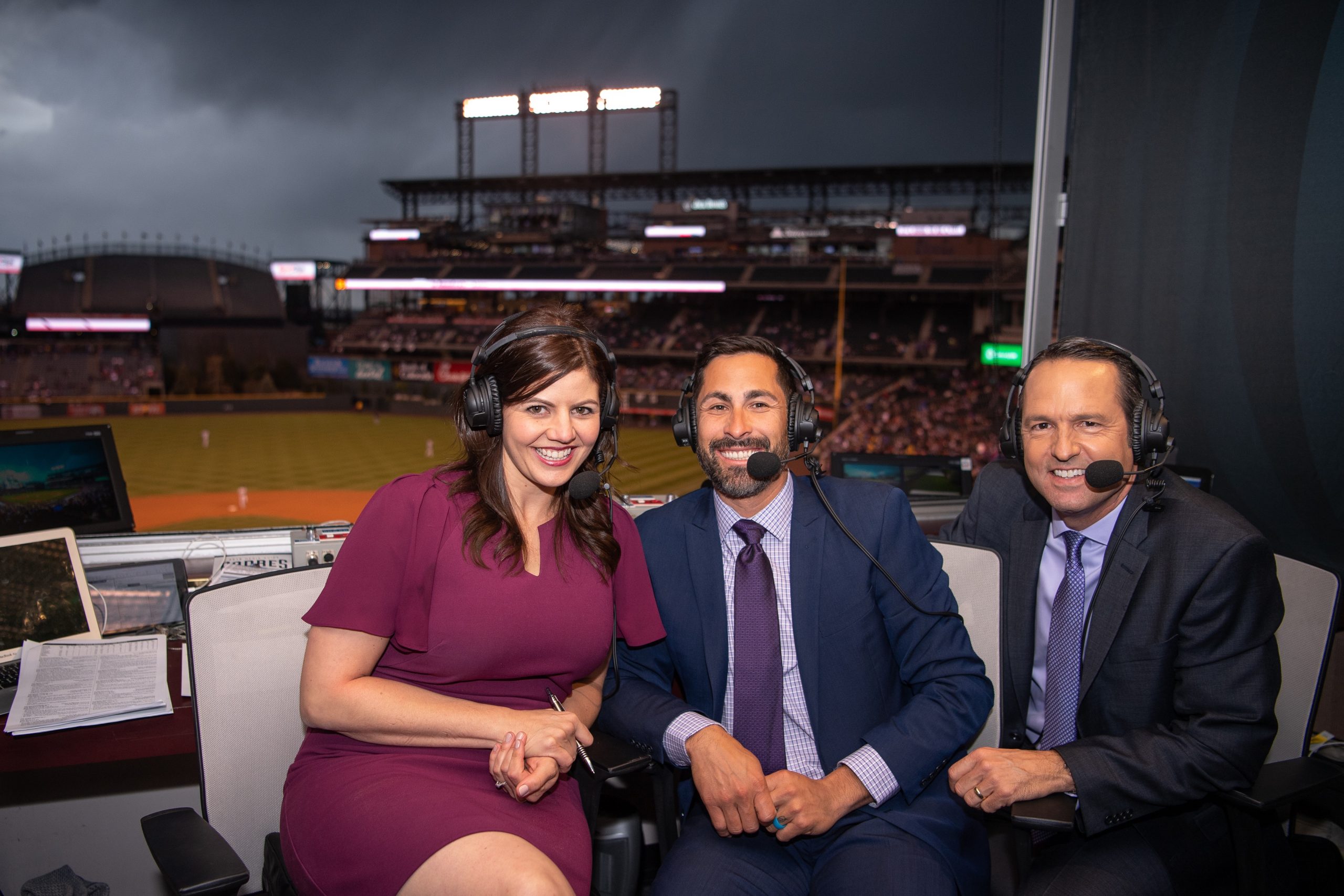
Jenny Cavnar in the booth with AT&T SportsNet Rocky Mountain analysts Ryan Spilborghs (center) and Jeff Huson
What does it mean to you to work alongside each other and other women in a male-dominated field?
Vigil: It’s a badge of honor, for sure. It’s awesome to work with women who support you and do great things. We were doing a game in Tampa and had a predominantly female crew. We had eight women on the front lines putting this broadcast on: our A1, graphics [operator], Erica and I, a camera operator, and others. They wanted to take a picture of us at the end of the series, and it was a great moment.
Ferrero: Same here. Alison and I were in San Francisco, and there was a young woman on the crew, and she came into the truck and said, “Can I take my picture with you?” I was confused and thinking she thought I was someone else; she really just wanted to take her photo with us. It meant a lot to her to see us as women producing and directing. It was a cool moment.
Cavnar: It’s a huge badge of honor because I wouldn’t be in my position or have my opportunity without these two women. They have been huge advocates of mine, which I’m so grateful for. I’ve had male advocates along the way, too, of course, but they give me confidence that we can all do this. I’m so proud to walk around a ballpark with both of them, to be able to walk in the TV truck and know that they’re leading our crew. Just the respect that they have around the league speaks for itself.
What do you hope will be different for the next generation of female broadcasters and production leaders as you three help pave the way?
Vigil: I hope that, somewhere along the way, we can find a culture that doesn’t think jokes about women are funny and doesn’t talk about women in a derogatory way. I hope that clubhouse culture or locker-room-talk mentality is a thing of the past. Having women in positions of leadership in our crew has changed a lot of that, but we still run into it from time to time. That’s not the kind of culture I want my daughters to grow up in — or my son, for that matter. I think it’s starting to change. When you have women in the room who can check people for saying something they shouldn’t be saying, that goes a long way. That’s the sort of culture I’m hoping we can change across all industries.
Ferrero: I would hope that, when a woman walks into the truck, there are no assumptions that she is a stage manager or a PA or something like that. I hope we get to a place where everybody is just doing their job and there are no assumptions made just because you’re a woman. Everybody can feel comfortable to be themselves. I feel so blessed that we are in a market where I work with so many great women and we have so many great women on our staff.
Cavnar: My parents told me, You can do anything you want to do. I’m not sure they believed that, but I hope, when I tell my daughter that, she believes it. I hope she has enough people to look around and see that it is possible to do whatever she wants to do.
I also hope Erica and Alison and women like them are in even higher positions of power than they are today; they both have ridiculous résumés and are deserving of those positions. There are not a lot of women executives in sports television, and I think that will be necessary to continue to create diversity and fairness and jobs within our industry.
This interview has been edited for length and clarity.
